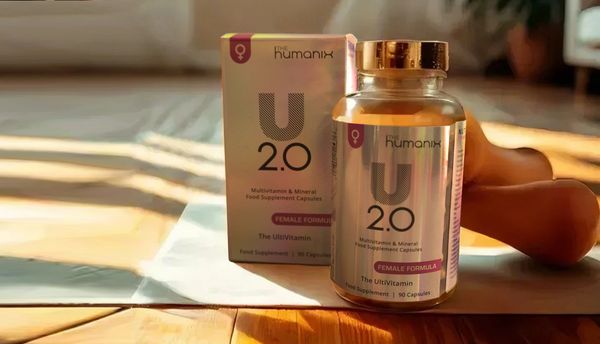





Female Formula Ingrediants
Vitamin B6, B12 & B3
Vitamin B6, B12 & B3
Vitamin B6, B12 & B3
Vitamin B6 (Pyridoxine) contributes to reduction of tiredness and fatigue.
Vitamin B12 plays an important role in synthesising and metabolising serotonin, a chemical responsible for regulating mood. A recent study established that vitamin B12 deficiency was associated with double the risk of severe depression.
Vitamin B3 is a micronutrient that your body needs for proper metabolism, nervous system function and antioxidant protection. Your brain requires niacin — as a part of the coenzymes NAD and NADP — to get energy and function properly. Scientific studies have linked brain fog and poor concentration with niacin deficiency.
Resveratrol
Vitamin B6, B12 & B3
Vitamin B6, B12 & B3
Resveratrol is a natural compound found in certain plants, particularly in the skin of red grapes. It has gained attention for its potential health benefits, often associated with its presence in red wine. Resveratrol is known for its antioxidant properties, which may help protect cells from damage caused by free radicals. Some studies suggest that it may support heart health and contribute to longevity. Additionally, resveratrol has been explored for its potential role in promoting healthy aging and overall well-being.
Damiana
Vitamin B6, B12 & B3
Siberian Ginseng
Damiana has been used for centuries by indigenous peoples in Mexico and Central America for its various medicinal properties. It was traditionally used as a tonic for the nervous system, as an aphrodisiac, and for its potential to boost mood and alleviate anxiety.
Siberian Ginseng
Siberian Ginseng
Siberian Ginseng
Also known as Eleuthero, Siberian Ginseng has been traditionally used to reduce stress and fatigue.
It is regarded as an adaptogen, a natural substance considered to help the body adapt to stress.
Research suggests that it helps support adrenal gland function whenever the body is subjected to stress.
Rhodiola
Siberian Ginseng
Rhodiola
Contributes to the normal function of the nervous system. Contributes to normal adaptation for emotional stress and physical effort. Promotes mental perception and state of mind and may be beneficial for sleeping difficulties, poor appetite, and poor work performance.
Zinc
Siberian Ginseng
Rhodiola
Zinc helps to make new cells and enzymes and plays an important role in the processing of nutrients in our food. It is also essential for normal growth and development. Another benefit of zinc is it helps our immune system function properly and plays a role in wound healing. Zinc also helps maintain healthy vision. Zinc supports normal fertility and reproduction and normal serum testosterone levels in the blood.
L-Histidine
Magnesium, Ginger & D-ribose
L-Histidine
L-Histidine is an essential amino acid which is involved in the formation of proteins and influences several of the metabolic reactions in the body.
These include tissue repair, building haemoglobin and strengthening the immune system.
Research shows that due to its ability to relax the blood
vessels, histidine may reduce blood pressure. It is also believed that it can help prevent certain cardiovascular conditions.
Lemon Balm
Magnesium, Ginger & D-ribose
L-Histidine
Lemon balm (Melissa officinalis) is a herb in the mint family. As far back as the 14th century, it has been used to treat a wide variety of medical disorders affecting the digestive tract, nervous system, and liver. These days, lemon balm is widely used in traditional medicine as a sleep aid. Recent research has indicated it may assist in reducing symptoms of sleep disorders.
Magnesium, Ginger & D-ribose
Magnesium, Ginger & D-ribose
Magnesium, Ginger & D-ribose
As well as helping to regulate the amount of strength and force your muscles can generate, magnesium also helps improve sleep quality and muscle recovery.
Ginger has been proven to be highly effective against exercise-induced muscle soreness and pain
Studies have shown that D-ribose enhances the recovery of energy reserves after inadequate blood supply to organs and tissues following high-intensity exercise.
Beta Alanine & Maca
Vitamin K12, Vitamin D3 & Vitamin E
Magnesium, Ginger & D-ribose
Beta Alanine raises muscle carnosine levels and increases the amount of work you can perform at high intensities.
Helps to maintain normal sexual desire.
Vitamin K12, Vitamin D3 & Vitamin E
Vitamin K12, Vitamin D3 & Vitamin E
Vitamin K12, Vitamin D3 & Vitamin E
Vitamin K2 (menaquinone) is an important nutrient that plays a role in everything from bone metabolism to blood clotting. It is also a vital component of optimum sex health. One study demonstrated that K2 works together with vitamin D3, to help increase testosterone release within your body.
Vitamin D is often called the "sixth steroid hormone" for its natural ability to boost testosterone. Numerous clinical trials support its role in increasing testosterone levels. It's also essential for brain health, with growing research linking vitamin D deficiency to Alzheimer’s. One study found that elderly women with the highest vitamin D intake had a lower risk of developing the disease.
Vitamin E supports circulation and contributes to the protection of cells from oxidative stress.
CoQ10
Vitamin K12, Vitamin D3 & Vitamin E
Vitamin K12, Vitamin D3 & Vitamin E
While your body produces CoQ10 naturally, its production tends to decrease with age. One of its primary functions is to help generate energy in your cells. It is involved in producing adenosine triphosphate (ATP), which works to transfer energy within cells. CoQ10 also plays a crucial role as an antioxidant, protecting cells from damage caused by oxidation. Health conditions such as heart disease, brain disorders, diabetes, and cancer have all been linked to low levels of CoQ10.
Copyright © 2025 The Humanix - All Rights Reserved.
